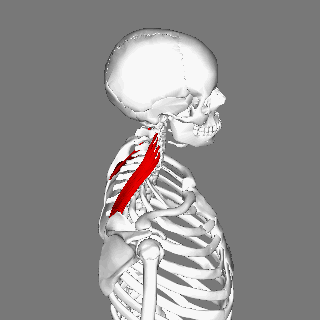Levator Scapulae: Difference between revisions
Wendy Walker (talk | contribs) (Created page with " {{subst:Muscles}}") |
Wendy Walker (talk | contribs) No edit summary |
||
| Line 1: | Line 1: | ||
<div class="editorbox"> | | ||
<div class="editorbox"> | |||
'''Original Editor '''- Your name will be added here if you created the original content for this page. | '''Original Editor '''- Your name will be added here if you created the original content for this page. | ||
'''Lead Editors''' - {{Special:Contributors/{{FULLPAGENAME}}}} | '''Lead Editors''' - {{Special:Contributors/{{FULLPAGENAME}}}} | ||
</div> | </div> | ||
== Description == | == Description<br> == | ||
== Origin == | Levator scapulae connects the upper limb to the vertebral column and lies in the posterior triangle of the neck | ||
Its superior aspect is covered by [[Sternocleidomastoid|Sternocleidomastoid]], and its inferior part by Trapezius | |||
[[Image:Levator scapulae muscle animation small2.gif]] | |||
== Origin == | |||
C1 to 4 | |||
Posterior tubercle of ransverse process of [[Cervical Vertebrae|Cervical Vertebrae]] 1 to 4 | |||
== Insertion == | == Insertion == | ||
[[Scapula|Scapula]] | |||
Vertebral margin of the scapula, between the superior angle and the root of the spine | |||
== Nerve Supply == | == Nerve Supply == | ||
C3 to 5 | |||
Cervical nerve (C3, C4) and dorsal scapular nerve (C5) | |||
== Blood Supply == | == Blood Supply == | ||
Descending scapular artery | |||
== Action == | == Action == | ||
Elevation and rotation of the scapula<br> | |||
== Function == | == Function == | ||
Elevation of the scapula, and rotation of it inferior angle medially, in movements such as elevation of the upper limb | |||
If the scapula is fixed, it helps produce cervical side flexion | |||
== Resources == | == Resources == | ||
| Line 22: | Line 49: | ||
== Recent Related Research (from [http://www.ncbi.nlm.nih.gov/pubmed/ Pubmed]) == | == Recent Related Research (from [http://www.ncbi.nlm.nih.gov/pubmed/ Pubmed]) == | ||
<div class="researchbox"> | <div class="researchbox"> | ||
<rss> | <rss>http://www.ncbi.nlm.nih.gov/entrez/eutils/erss.cgi?rss_guid=1FuuOtUS4LZY8-WJlC48y0hbxuQBN_8RydEQxIP3U8qWHcHQ0d|charset=UTF-8|short|max=10</rss> | ||
</div> | </div> | ||
== References == | == References == | ||
| Line 28: | Line 55: | ||
References will automatically be added here, see [[Adding References|adding references tutorial]]. | References will automatically be added here, see [[Adding References|adding references tutorial]]. | ||
<references /> | <references /> | ||
[[Category:Cervical_Anatomy]] | |||
Revision as of 00:57, 22 January 2014
Original Editor - Your name will be added here if you created the original content for this page.
Lead Editors - Eric Henderson, SULEIMAN USMAN, Kim Jackson, Lucinda hampton, WikiSysop, Admin, Wendy Walker, Joao Costa, Evan Thomas, Oyemi Sillo and Tarina van der Stockt
Description
[edit | edit source]
Levator scapulae connects the upper limb to the vertebral column and lies in the posterior triangle of the neck
Its superior aspect is covered by Sternocleidomastoid, and its inferior part by Trapezius
Origin[edit | edit source]
C1 to 4
Posterior tubercle of ransverse process of Cervical Vertebrae 1 to 4
Insertion[edit | edit source]
Vertebral margin of the scapula, between the superior angle and the root of the spine
Nerve Supply[edit | edit source]
C3 to 5
Cervical nerve (C3, C4) and dorsal scapular nerve (C5)
Blood Supply[edit | edit source]
Descending scapular artery
Action[edit | edit source]
Elevation and rotation of the scapula
Function[edit | edit source]
Elevation of the scapula, and rotation of it inferior angle medially, in movements such as elevation of the upper limb
If the scapula is fixed, it helps produce cervical side flexion
Resources[edit | edit source]
Recent Related Research (from Pubmed)[edit | edit source]
Failed to load RSS feed from http://www.ncbi.nlm.nih.gov/entrez/eutils/erss.cgi?rss_guid=1FuuOtUS4LZY8-WJlC48y0hbxuQBN_8RydEQxIP3U8qWHcHQ0d|charset=UTF-8|short|max=10: Error parsing XML for RSS
References[edit | edit source]
References will automatically be added here, see adding references tutorial.







